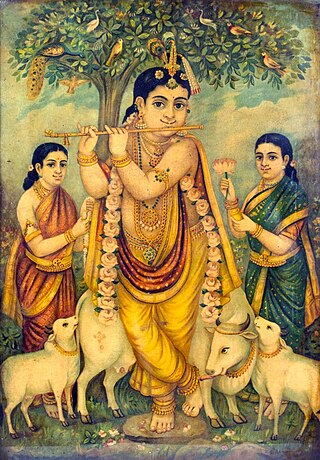Top Qs
Timeline
Chat
Perspective
Dvadasha Stotra
Hindu hymn From Wikipedia, the free encyclopedia
Remove ads
The Dvadasha Stotra (Sanskrit: द्वादशस्तोत्रम्, romanized: Dvādaśastotraṃ) is a series of 12 stotras, or religious hymns, composed by Madhvacharya, the 13th-century founder of the Dvaita school of Indian philosophy. Dvadaśa in Sanskrit means "twelve", and all the 12 stotras are in praise of the Hindu god Vishnu.[1][2] The third stotra is considered a summary of Madhvacharya's philosophy.[3]
It is believed that the stotras were composed in connection with the installation of the idol of the Hindu god Krishna at Udupi.[4]
There have been numerous musical compositions of the Dvadasha Stotra over the years. It is also a ritual to recite the Dvadasha Stotra at the time of naivedya[5] or the offering of food to God performed at Madhva temples.
Remove ads
Hymn
The first verse of the stotra is as follows:[6]
vande vandyam sadanandam
vasudevam niranjanam
indirdpatimadyadi
varadesavarapradam
I reverentially salute Vasudeva the adorable, of the nature of impeccable bliss, immaculate, the Lord of Indra and the bestower of boons on boon-giving lords such as Brahma and others.— Verse 1
Commentaries and translations
There are eight known commentaries on the Dvadasha Stotra,[7] authored by:
- Gangodamishra
- Gudhakartrika
- Chalari Narasimhacharya
- Channapattana Thimmannacharya
- Umarji Tirumalacharya
- C M Padmanabhacharya
- Punyashravana Bhikshu
- Sri Vishwapati Tîrtha
See also
References
External links
Wikiwand - on
Seamless Wikipedia browsing. On steroids.
Remove ads

